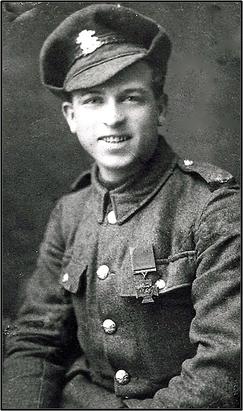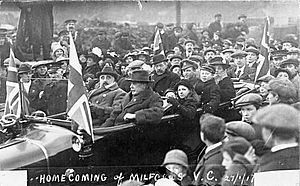Hubert William Lewis facts for kids
Quick facts for kids
Hubert William Lewis
|
|
|---|---|

Hubert William Lewis VC
|
|
| Nickname(s) | Stokey |
| Born | 1 May 1896 Milford Haven, Pembrokeshire, Wales |
| Died | 22 February 1977 (aged 80) Milford Haven, Pembrokeshire, Wales |
| Buried |
Milford Haven Cemetery, Milford Haven
|
| Allegiance | |
| Service/ |
|
| Years of service | 1914− |
| Rank | Lance Corporal |
| Service number | 16224 |
| Unit | Welch Regiment Home Guard |
| Battles/wars | World War I |
| Awards | Médaille militaire |
Hubert William Lewis (born 1 May 1896 – died 22 February 1977) was a brave Welsh soldier. He received the Victoria Cross (VC), which is the highest award for bravery in the face of the enemy for British and Commonwealth forces.
Hubert was born in Milford Haven, Wales. He left school at 13 to work in a fish market. In 1914, he joined the Welsh Regiment and fought in the First World War. During a night raid, even though he was wounded twice, he bravely captured three enemy soldiers by himself. He then carried a wounded officer to safety while under heavy artillery fire. For these amazing actions, he was given the Victoria Cross. He was the youngest Welsh person to receive this award. Later, in 1918, he saved another officer in a similar way.
After the war, Hubert returned to Milford Haven. He got married and had three children. He continued working at the fish market for over 40 years. During the Second World War, he served in the Home Guard. When he passed away in 1977, he was the last surviving Welsh Victoria Cross winner from the First World War.
Contents
Early Life and Work
Hubert Lewis was born on 1 May 1896 in Milford Haven, a coastal town in Pembrokeshire, Wales. He was the second of four children. His father, Adrian Lewis, worked at the Milford Haven docks. Hubert's father was known as "Stokey," so Hubert was called "Young Stokey" and later "Stokey" himself.
Hubert went to Milford Haven National School. When he was 13, he left school to work as a packer in the town's fish market. People who knew him said he was a bit of a prankster. He also enjoyed playing amateur football for a local team called Milford Haven Stars.
Joining the First World War
In September 1914, when Hubert was 18, he joined the army. He signed up for the 11th (Service) Battalion of the Welsh Regiment. This unit was a "pals battalion," meaning friends and people from the same area joined together. Hubert was one of 75 local volunteers from Milford Haven.
After joining, Hubert trained in different places like Cardiff, Lewes, and Seaford. On 5 September 1915, about a year after enlisting, Hubert and his unit sailed to France. There, he became a machine gunner with the 9th (Service) Battalion, Border Regiment.
Hubert's Victoria Cross Bravery
Soon after, the country of Bulgaria joined the war on the German side. Because of this, Hubert's regiment was moved from the Western Front to Greece. They were sent to the Macedonian front to prepare for battles there.
On 17 October 1916, Hubert's battalion was ordered to attack German trenches. Bad weather delayed the attack, but it finally happened at 9 p.m. on 22 October. Hubert was part of "D" Party. As they moved forward, a German guard spotted them. The enemy started firing machine guns and artillery. Hubert was hit in the arm, but he refused medical help because other soldiers were more badly wounded.
During a short break in the shelling, Captain Guthrie Morgan led about 150 men, including Hubert, into the German trenches. They fought hand-to-hand and took control of the trenches. Hubert was wounded a second time during this fight, but he still refused treatment. He kept going through the enemy trench and found three German soldiers. Hubert fought them with his rifle and bayonet, and they surrendered to him! Captain Morgan and another soldier saw this brave act.
The German forces then launched another attack, and Hubert's battalion was ordered to retreat. As they were going back to their own lines, Hubert heard a wounded officer, Lieutenant Turner, calling for help. Even though Hubert had two wounds himself, he carried the wounded officer over his shoulder. He carried him through enemy artillery fire all the way back to safety. They reached their lines at 4:30 a.m. the next morning. Hubert finally let Lieutenant Turner down and then collapsed from exhaustion.
For his incredible bravery, Hubert Lewis was awarded the Victoria Cross (VC). The award was announced on 15 December 1916. The official statement said:
For most conspicuous bravery and devotion to duty during a raid.
On reaching the enemy trenches Private Lewis was twice wounded, but refused to be attended to, and showed great gallantry in searching enemy dug-outs. He was again wounded and again refused attendance. At this point three of the enemy were observed to be approaching, and Private Lewis immediately attacked them single-handed, capturing all.
Subsequently, during the retirement, he went to the assistance of a wounded man, and under heavy shell and rifle fire brought him to our lines, on reaching which he collapsed. Private Lewis showed throughout a brilliant example of courage, endurance and devotion to duty.—The London Gazette, 15 December 1916"
Hubert returned home in January 1917. He received his Victoria Cross from King George V at Buckingham Palace on 5 February 1917. At 20 years old, he was the youngest Welsh person to receive the award.
More Brave Actions
Just ten days after getting his VC, Hubert went back to the front lines. In June 1918, he was praised again for his bravery. He rescued Captain Morgan during an attack near Salonika. Hubert saw his captain fall and rushed to help him, even though he was suffering from poisonous gas and fighting off Bulgarian troops. He then carried Captain Morgan back to safety. Captain Morgan later wrote to Hubert, saying he deserved another Victoria Cross. However, Hubert did not receive a second VC. Only one other soldier received two VCs during the First World War.
Hubert was also awarded the Médaille militaire by France in July 1917. He was promoted to lance corporal on 16 April 1919.
Life After the War
After the war ended, Hubert Lewis returned to his hometown of Milford Haven. He went back to working at the fish market. Later, he worked for the Milford Haven Ice Company, where he eventually became the foreman. He worked there for 43 years and was known locally as "VC Lewis."
Hubert married Edith Eveline Etherington on 9 October 1920. They had three sons: Edward, Vernon, and Arthur. In 1921, he was asked to unveil the County of Pembroke War Memorial in Haverfordwest.
During the Second World War, Hubert served in the Home Guard. Sadly, one of his sons, Vernon, who was a flight sergeant in the RAF, was killed in a bombing raid over Germany in August 1943. He was 22 years old. Hubert later received his son's posthumous Distinguished Flying Medal from King George VI in May 1946.
Hubert was active in the veteran community. He was the vice-president of the Milford Haven branch of The Royal British Legion. He became friends with other Victoria Cross recipients, Ivor Rees and Edward Thomas Chapman. In 1964, they all attended the film premiere of Zulu and dined with actor Michael Caine.
Hubert's wife, Edith, passed away in 1969. Hubert died eight years later in Milford Haven on 22 February 1977, at the age of 80. He was buried next to his wife. At the time of his death, he was the last surviving Welsh Victoria Cross recipient from the First World War.
Hubert Lewis's medals, including his Victoria Cross, were later bought by Lord Ashcroft in 1999. His VC is now on display in the Lord Ashcroft Gallery at the Imperial War Museum in London.
Images for kids
 | Lonnie Johnson |
 | Granville Woods |
 | Lewis Howard Latimer |
 | James West |




